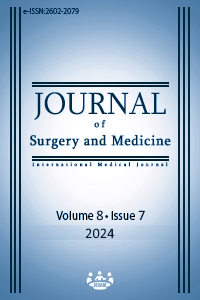Evaluation of the use of hormonal contraceptive methods and awareness of a group of women with cardiological symptoms and diseases
Hormonal contraceptive use by women with cardiological issues
Keywords:
Hormonal contraceptives, cardiologic disease, cardiologic symptoms, contraceptive counseling, progesteronAbstract
Background/Aim: Hormonal contraceptives can carry risks, particularly for women with chronic conditions such as heart disease and diabetes. A wide range of basic science, animal, and human studies indicate an enduringly heightened risk of venous thromboembolism, hypertension, myocardial infarction, and ischemic stroke associated with birth control hormones (estrogen and progestogen). According to the guidelines, women aged 35 and over considering hormonal contraceptives should be evaluated for vascular diseases and cardiovascular risk factors. However, the number of studies on this subject is insufficient. This study aimed to assess the use of hormonal contraceptive methods and the knowledge levels of women with cardiological symptoms and diseases attending a cardiology outpatient clinic.
Methods: A descriptive and cross-sectional study was conducted with cardiological problems (diagnosed or being treated at the Cardiology Polyclinic) of women between the ages of 18 and 45. Data were collected through face-to-face interviews using the Sociodemographic Characteristics Form and the Structured Contraception Knowledge Level Form. The study sample consisted of 190 women visiting a state hospital’s Cardiology Polyclinic in Istanbul between October 2019 and January 2020.
Results: Among the participants, 24.8% used hormonal contraceptives, and 15.8% reported facing problems while using them, most commonly experiencing constant headaches (53.3%) and iron deficiency (30%). The study revealed that 7.9% of the participants had cardiovascular disease, with 52.1% experiencing cardiological symptoms, such as palpitations and rapid heartbeat. A total of 24.7% had received family planning counseling, and 59.6% believed that counseling influenced their contraceptive choices. Those who received counseling showed greater knowledge regarding the safety of progesterone-only birth control pills for women with heart disease.
Conclusion: Women with cardiovascular disease should be well informed about the risks associated with hormonal contraceptives. The study emphasizes the importance of counseling services provided by nurses in cardiology and obstetrics clinics to guide women toward safer contraceptive options. Continuous monitoring and education are essential to ensure women’s health and safety in contraceptive choices.
Downloads
References
Avcı N, Kaydırak MM, Satılmış İS. Contraception in Special Groups and Individuals with Chronic Health Problems. Halic Uni J Health Sci. 2021;3:173–86. doi: 10.48124/husagbilder.879335 DOI: https://doi.org/10.48124/husagbilder.879335
Taşkin L. Doğum ve kadın sağlığı hemşireliği. Akademisyen Kitabevi. 2019
Pala A. Derin ven trombozu etiyolojisi ve tanısı. Venöz ve Lenfatik Sistem Hastalıkları Publisher: Akademisyen Kitabevi. 2020;131–42.
Gerardin JF, Cohen S. Counseling for Perinatal Outcomes in Women with Congenital Heart Disease. Clin Perinatol. 2022;49(1):43–53. doi: 10.1016/j.clp.2021.11.004. Epub 2022 Jan 21. PMID: 35210008. DOI: https://doi.org/10.1016/j.clp.2021.11.004
Centers for Disease Control and Prevention (CDC). Summary chart of US medical eligibility criteria for contraceptive use. [Internet]. [Assessed Date: 26 June 2023]. https://www.cdc.gov/reproductivehealth/contraception/pdf/summary-chart-us-medical-eligibility-criteria_ 508tagged.pdf
Khialani D, Rosendaal F, Vlieg AVH. Hormonal Contraceptives and the Risk of Venous Thrombosis. Semin Thromb Hemost. 2020;46(8):865–71. doi: 10.1055/s-0040-1715793. Epub 2020 Oct 5. PMID: 33017848. DOI: https://doi.org/10.1055/s-0040-1715793
Iqbal UJ, Latif L. Contraception knowledge and practices among females presented with cardiac diseases at gulab devi hospital lahore. Pakistan Heart Journal. 2020;53:35–9. doi: 10.47144/phj.v53i1.1711 DOI: https://doi.org/10.47144/phj.v53i1.1711
Acar ZK, Şahin NH, Demirci FN. Preference of Contraceptives of Married Women Between 18-49 and Causes of Discontinuation. Ordu University J Nurs Study Journal. 2021;1:29–38. doi: 10.38108/ouhcd.851213 DOI: https://doi.org/10.38108/ouhcd.851213
Okoth K, Chandan JS, Marshall T, Thangaratinam S, Thomas GN, Nirantharakumar K, et al. Association between the reproductive health of young women and cardiovascular disease in later life: umbrella review. BMJ. 2020 Oct 7;371:m3502. doi: 10.1136/bmj.m3502. Erratum in: BMJ. 2020 Oct 14;371:m3963. PMID: 33028606; PMCID: PMC7537472. DOI: https://doi.org/10.1136/bmj.m3502
Ünal B. Kalp ve Damar hastalıkları. (eds) Ünal B, Ergör G. “Türkiye Kronik Hastalıklar ve Risk Faktörleri Sıklığı Çalışması” içinde. Ankara, Anıl Matbaa Ltd. Şti. Sağlık Bakanlığı Yayın no: 909. 2013:191–203.
Civek S, Akman M. Dünyada ve Türkiye’de kardiyovasküler hastalıkların sıklığı ve riskin değerlendirilmesi. Jour Turk Fam Phy. 2022;1:21-8. doi: 10.15511/tjtfp.22.00121 DOI: https://doi.org/10.15511/tjtfp.22.00121
Kirici P, Kaplan S, Karaçor T, Nacar MC. The Effect Of The Family Planning Counselling Service On Women’s Choice Of Contraceptive Method: A Tertiary Healthcare Center Experience. The Journal of Gynecology - Obstetrics and Neonatology. 2020;3:425–30. doi: 10.38136/jgon.698866 DOI: https://doi.org/10.38136/jgon.698866
Hisar KM, Şahlar TE. Reasons for Changing the Family Planning Method Women Use. Journal JGEHES. 2021;3:250–8. doi: 10.51123/jgehes.2021.34 DOI: https://doi.org/10.51123/jgehes.2021.34
Divani AA, Luo X, Datta YH, Flaherty JD, Panoskaltsis-Mortari A. Effect of oral and vaginal hormonal contraceptives on inflammatory blood biomarkers. Mediators Inflamm. 2015;2015:379501. doi: 10.1155/2015/379501. Epub 2015 Mar 16. PMID: 25861161; PMCID: PMC4378601. DOI: https://doi.org/10.1155/2015/379501
Rahhal A, Khir F, Adam M, Aljundi A, Mohsen MK, Al-Suwaidi J. Low dose combined oral contraceptives induced thrombotic anterior wall myocardial infarction: a case report. BMC Cardiovasc Disord. 2020;19:182. doi: 10.1186/s12872-020-01462-9. PMID: 32306901; PMCID: PMC7168836. DOI: https://doi.org/10.1186/s12872-020-01462-9
Yilmaz N, Buyuk GN. The role of new generation progestin only pills and contraception during the covid-19 pandemic. The Journal of Gynecology - Obstetrics and Neonatology. 2021;18:746–50. doi: 10.38136/jgon.861698. DOI: https://doi.org/10.38136/jgon.861698
Downloads
- 504 1362
Published
Issue
Section
How to Cite
License
Copyright (c) 2024 Hülya Tosun, Meryem Yıldız Ayvaz
This work is licensed under a Creative Commons Attribution-NonCommercial-NoDerivatives 4.0 International License.
















